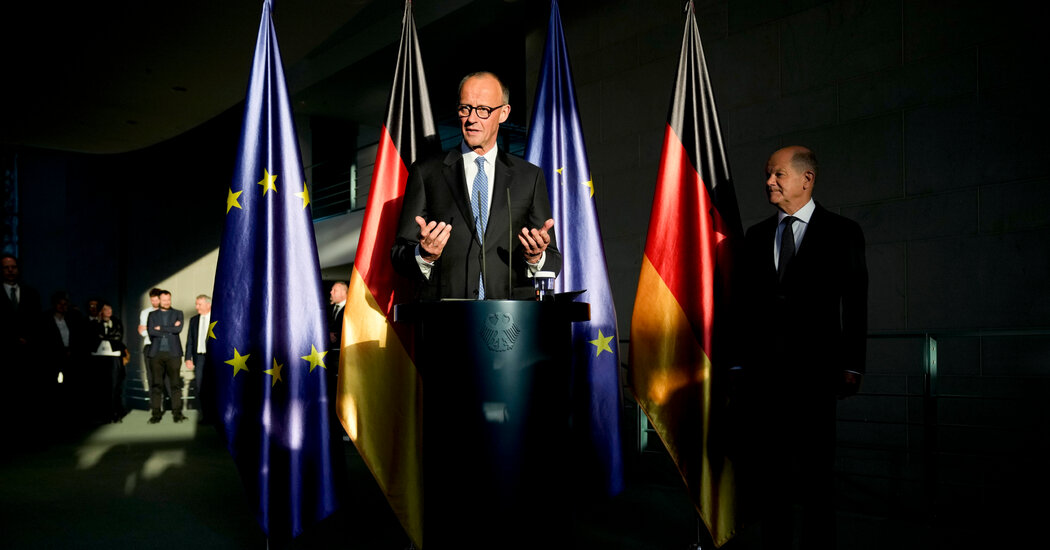Friedrich Merz became Germany’s 10th postwar chancellor on Tuesday after a historic stumble that could complicate his efforts to revive the nation’s slumping economy, tighten its borders and rebuild its military, at a time when an isolated Europe is hungry for strong German leadership.
After 10 weeks as the nation’s leader-in-waiting following his party’s victory in February elections, Mr. Merz initially fell six votes short in the parliamentary vote for chancellor on Tuesday morning — a defeat without precedent in modern Germany’s history.
The votes were conducted on secret ballots, leaving the reasons for the failure murky; the parties in the new governing coalition held more than enough seats to elect him. But some lawmakers speculated that a series of individual protest votes had, possibly by accident, added up to an embarrassing setback.
Mr. Merz, 69, rebounded to win on a second ballot in the afternoon. Still, rival parties and outside analysts warned that his credibility had suffered at home and abroad, and his opponents on Germany’s far left and far right alike said that Mr. Merz had lost legitimacy.
Political observers said the brief setback could make it more difficult than expected for the new chancellor to project strength on the world stage and to pass critical legislation to advance his agenda. Mr. Merz had hoped for a clear vote of confidence in Parliament as he seeks to confront President Trump’s tariff threats against Germany’s export-heavy economy, reverse his country’s economic malaise and counter an aggressive Russia to the east.
“Germany and Europe need to serve as anchors of stability in a volatile global environment,” said Cathryn Clüver Ashbrook, the senior vice president for Bertelsmann Stiftung, a nonpartisan foundation based in Gütersloh, Germany. But Mr. Merz’s unexpectedly delayed election “could signal rocky times ahead.”
“Voters’ trust in elite policymakers is already dwindling,” Ms. Ashbrook said. “Self-doubt inside a government is pernicious in a moment like this.”
Mr. Merz had been largely expected to win on the first ballot, and the dissenters did not identify themselves.
But based on the makeup of Parliament, there appeared to be more than a dozen of them from within Mr. Merz’s party, the center-right Christian Democrats; its sister party, the Christian Social Union; and their coalition partner, the center-left Social Democrats. The three parties hold 328 seats, with 316 needed for a majority.
The coalition rallied behind Mr. Merz in the afternoon, with members warning of dire consequences if there were further delay. He picked up 15 additional votes in the second round, more than enough to secure the job.
“It is important that Germany gets a stable government, that we can very quickly start working within reliable structures, and that we work to ensure that this country is strong and well governed,” Lars Klingbeil of the Social Democrats, Germany’s new vice chancellor, told reporters.
On Tuesday evening, several lawmakers said privately that lawmakers from across the coalition had likely voted against Mr. Merz and Mr. Klingbeil out of protest. Both men have angered factions of their own parties while making compromises to forge a coalition agreement, including Mr. Merz’s decision to reverse a campaign promise and endorse a plan to relax limits on government borrowing and spending.
Lawmakers speculated that those protesters did not know that there were enough votes against Mr. Merz to actually derail his bid.
The protests mostly vanished by the afternoon, following stern speeches from each of the coalition leaders to their party members. Jens Spahn of the Christian Democrats told reporters that “all of Europe and maybe the entire world” were watching the vote, and appealed to his lawmakers to be “aware of that special responsibility.”
Having won the chancellorship, Mr. Merz now inherits a stark set of mounting challenges. The German economy shrank last year, continuing a half-decade trend that has demoralized workers and business leaders alike. Prospects for new growth appear dim, particularly with the threats posed to Germany’s export-oriented manufacturing sector by Mr. Trump’s punishing tariff measures.
Mr. Trump is also threatening to rip away America’s European defense umbrella, complicating relations between Germany and the United States, its most important ally of the postwar era. In addition to Russia’s invasion of Ukraine to the east, the Kremlin has embarked on what security analysts have called a deliberate sabotage campaign targeting Europe.
The new chancellor will also need to act decisively to address Germans’ concerns about a decade-long flow of immigration to the country from the Middle East, Africa and elsewhere — concerns that have been inflamed by a string of deadly attacks committed by immigrants.
And he will need to hold off the far-right Alternative for Germany party, or AfD, which has drawn nearly even with Mr. Merz’s party in national polls and which has received vocal support from prominent Trump allies like the billionaire Elon Musk.
The AfD has promised to crack down on migration, and it has gained support from voters disillusioned with Germany’s longtime governing class on the center left and the center right. It has also been classified as a far-right extremist group by German intelligence.
After his delayed victory, Mr. Merz wasted no time diving into those challenges. He immediately began the ceremonial tasks of assuming the country’s top leadership post, he and his cabinet were sworn in after meeting with Germany’s president, and he was set to convene his first cabinet meeting at 10 p.m. local time.
On Wednesday, Mr. Merz is set to travel to Paris and Warsaw to meet with key allies. He will also visit Ukraine and Brussels soon, and is expected to go to Washington after that.
The surprise drama in Germany’s Parliament had politicians across Europe concerned about what Mr. Merz’s stumble might mean for a continent that is increasingly looking to Germany for leadership.
“Naturally we need a strong government in Berlin,” Kaja Kallas, the European Union’s high representative for foreign affairs and security policy, said in an interview with the German broadcaster Phoenix. “What happens in German politics, but also in its economy, has an impact on all European countries.”
German stocks slid on the news of the first vote, with economists warning it could be an ominous sign for Mr. Merz’s agenda to revitalize growth in Europe’s biggest economy. Germany’s blue chip index fell, led by drops in defense and energy companies that stood to benefit from the future government’s planned investment programs.
They regained much of those losses after Mr. Merz won the second round.
There was a palpable sense of relief in Parliament after Mr. Merz won that vote. Lawmakers lined up to congratulate him, including some from outside his coalition, like members of the center-left Green Party. Among the first to shake his hand was Olaf Scholz, his predecessor and opponent in the last campaign, who insisted in recent weeks that the transfer of power to his successor happen quickly and smoothly.
After the vote, one senior lawmaker was heard on the phone saying that he now could finally get to work.
Melissa Eddy and Clay Risen contributed reporting from Berlin.


